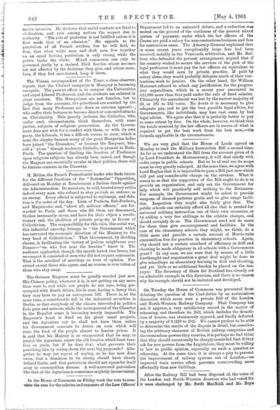In the House of Commons on Friday week the vote
to com- sdete the sum for the salaries and expenses of the Law Officers' Department led to an animated debate, and a reduction was moved on the ground of the costliness of the present mixed system of payment, under which the law officers of the Crown are paid a salary for non-contentious business and fees for contentious cases. The Attorney-General explained that in some recent years exceptionally large fees had been received, notably in the Venezuela arbitration, and Mr. Bal- four, who defended the present arrangement, argued that if the country wished to secure the services of the pick of the legal profession it must pay the law officers an equivalent to what they would earn by private practice. If paid by salary alone, they would probably delegate much of their con. tentious work to juniors. On the other hand, Sir William Harcourt refused to admit any justification for the progres- sive expenditure, which in a recent year amounted to £11,000 more than that paid under the rule of fixed salaries. Ultimately the amendment was lost by the narrow majority of 33, or 185 to 152 votes. No doubt it is necessary to give adequate pay, and to get the best possible legal advice, for Governments, like individuals, may lose vast sums ,by bad legal advice. We agree also that it is probably better to pay to some extent by fees. On the whole, however, we think that the totals received by the law officers are in excess of what is required to get the best work from the best men,—the formula applicable in the circumstances.










































 Previous page
Previous page